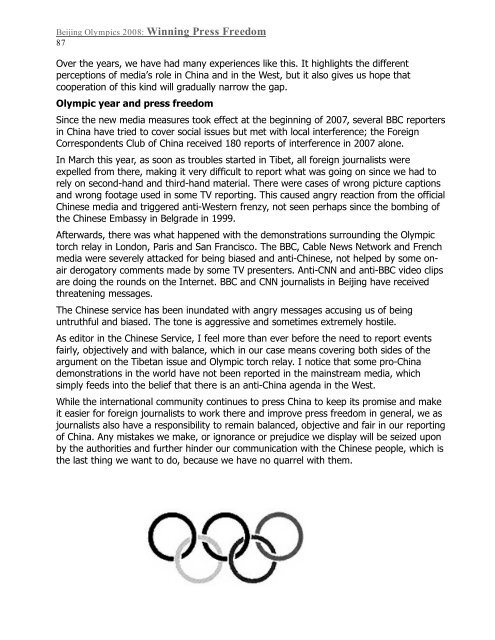Beijing Olympics 2008: Winning Press Freedom - World Press ...
Beijing Olympics 2008: Winning Press Freedom - World Press ...
Beijing Olympics 2008: Winning Press Freedom - World Press ...
Create successful ePaper yourself
Turn your PDF publications into a flip-book with our unique Google optimized e-Paper software.
<strong>Beijing</strong> <strong>Olympics</strong> <strong>2008</strong>: <strong>Winning</strong> <strong>Press</strong> <strong>Freedom</strong><br />
87<br />
Over the years, we have had many experiences like this. It highlights the different<br />
perceptions of media’s role in China and in the West, but it also gives us hope that<br />
cooperation of this kind will gradually narrow the gap.<br />
Olympic year and press freedom<br />
Since the new media measures took effect at the beginning of 2007, several BBC reporters<br />
in China have tried to cover social issues but met with local interference; the Foreign<br />
Correspondents Club of China received 180 reports of interference in 2007 alone.<br />
In March this year, as soon as troubles started in Tibet, all foreign journalists were<br />
expelled from there, making it very difficult to report what was going on since we had to<br />
rely on second-hand and third-hand material. There were cases of wrong picture captions<br />
and wrong footage used in some TV reporting. This caused angry reaction from the official<br />
Chinese media and triggered anti-Western frenzy, not seen perhaps since the bombing of<br />
the Chinese Embassy in Belgrade in 1999.<br />
Afterwards, there was what happened with the demonstrations surrounding the Olympic<br />
torch relay in London, Paris and San Francisco. The BBC, Cable News Network and French<br />
media were severely attacked for being biased and anti-Chinese, not helped by some onair<br />
derogatory comments made by some TV presenters. Anti-CNN and anti-BBC video clips<br />
are doing the rounds on the Internet. BBC and CNN journalists in <strong>Beijing</strong> have received<br />
threatening messages.<br />
The Chinese service has been inundated with angry messages accusing us of being<br />
untruthful and biased. The tone is aggressive and sometimes extremely hostile.<br />
As editor in the Chinese Service, I feel more than ever before the need to report events<br />
fairly, objectively and with balance, which in our case means covering both sides of the<br />
argument on the Tibetan issue and Olympic torch relay. I notice that some pro-China<br />
demonstrations in the world have not been reported in the mainstream media, which<br />
simply feeds into the belief that there is an anti-China agenda in the West.<br />
While the international community continues to press China to keep its promise and make<br />
it easier for foreign journalists to work there and improve press freedom in general, we as<br />
journalists also have a responsibility to remain balanced, objective and fair in our reporting<br />
of China. Any mistakes we make, or ignorance or prejudice we display will be seized upon<br />
by the authorities and further hinder our communication with the Chinese people, which is<br />
the last thing we want to do, because we have no quarrel with them.





